Going Zero Waste
Would you be able to recommend any how-to books on going zero waste? I'm really upset at all the plastic I have to throw out in everyday life (mostly from food packaging, whether restaurant or grocery store) but I'm not sure where to begin in changing it. If there's a book that describes steps to take, that would be very helpful for me. Thank you!
Going zero waste
Realistic goals:
First of all, good on you for wanting to lessen your waste output!
Second of all, while going zero waste is a really noble goal, it's not always feasible, especially in our current economy. That's nothing you should feel guilty over. That's just a fact.
Those pictures of people who can fit a year's worth of trash in one mason jar look great, but it's okay if you can't do that. For example, while I personally try to avoid having to throw out plastic, I'm also very grateful for the fact that plastic allows me to have an emergency asthma inhaler on hand at all times. Another example could be how bulk shopping can help cut back on waste, but might not be feasible due to financial or physical constraints.
That being said, replacing some single-use items is still better than doing nothing at all. Don't let perfectionism stop you!
It's important to set realistic goals. For example: you mentioned you'd like to try and avoid waste from food packaging. If you often eat on the go, you could keeping a set of reusable cutlery in your bag so you don't have to use single-use utensils every time you buy food. You could check if apps like Too Good To Go or imperfect produce boxes are available in your area. Maybe you've got a local farmer's market or a bulk shop or a community garden around. Maybe your supermarket allows you to bring your own produce bags while shopping. You could try looking for brands that use less or recycled packaging if your financial situation allows for that. If you enjoy cooking, you could look into bringing your own food on the go more often, or learn how to freeze or preserve food.
You don't have to do all of these: pick out ideas that seem like a good match for your personal situation. Start with small changes and turn them into habits, rather than going all-out from the start.
Resources:
The one book I often see referred to when it comes to zero waste is "Zero waste home: the ultimate guide to simplifying your life by reducing your waste" by Bea Johnson. I haven't read the entire thing yet, but I've read parts and it's a handy place to start. If your local library doesn't have a copy available, you can borrow a digital version for free on Archive.org.
While not necessarily focused on zero waste, I quite like Marie Kondo's philosophy too. The manga version of her book is an easy read if you want something quick to get started with.
Not books, but Shelbizleee and Sustainably Vegan on YouTube also run interesting zero waste channels.
Take what you personally find useful from resources like these, but don't feel obligated to follow them to the letter. Eco-anxiety can sometimes push us to try things we're not comfortable with or which aren't safe for us, so it's important to remain mindful of your personal boundaries.
I'm sure others can add more book recommendations to this post. :)
The five R's:
One way to get started is to take a look at the five basic zero waste principles.
There are different versions of the zero waste "R" list, but the one cited the most is the five R's of zero waste: refuse, reduce, reuse, recycle, and rot.

(Image source) [ID: an inverted pyramid with five steps, reading from the top to the bottom: "Refuse, reduce, reuse, recycle, rot".]
Refuse: a lot of waste comes from things we don't really need. Will you actually wear that t-shirt that's on sale right now? Do you need another free pen even though you still have ten unused ones lying around at home? What about your junk mail, do you actually enjoy receiving all those flyers? The idea is to re-evaluate the objects that come into your possession, and to refuse the ones you won't use.
Note: the "refuse" and "reduce" principles can be stressful when you've grown up in an environment that was lacking certain material needs, or when you still find yourself in this situation. Take small steps, stick to your personal boundaries, and be mindful of your (mental) health.
Reduce: a lot of us own more than we actually need. If you find you've got objects you barely use, e.g. shirts you haven't worn in years or unused craft materials bought on a whim, ask yourself if you really need them. Would you miss them if you got rid of them, or would you barely notice? Do they make you happy, or do they just take up space? Maybe it's time to find a new home for these items.
Note: there are certain things in life we just really need, even if some of those things might seem frivolous to others. Don't get rid of things you might regret later, or that you actually need even though all the zero waste sources say you could probably do without. Everyone's situation's different. When you do get rid of things, don't just throw them out even if you plan on replacing them with sustainable alternatives: this will just create more waste. Use what you have first, and consider selling, donating or gifting items you don't need any more.
Reuse: one way to avoid waste is to reuse an item until it falls apart, or to find new uses for something. Mend your clothes, repair your stuff, reuse packaging when shipping parcels, cook with food scraps, shop second-hand,... Once you've finished something, check if you can replace it with a reusable alternative instead of buying it again (e.g. water bottles, reusable cutlery, fabric tote bags,...).
Note: be mindful of your health. Sometimes, things just have to be replaced!
Recycle: recycling isn't perfect, but it's important. Look up your local recycling policies, and sort your trash accordingly.
Rot: when organic trash goes to landfill, it will likely decompose in a way that will make it release a lot of methane. When we compost it, it will turn into plant food. If you've got access to an outdoor space, start a compost heap. If you've got a balcony, you could try vermicomposting or bokashi. If you don't have access to outdoor spaces at all, you could try indoor composting (if you're comfortable with that) or find a neighbour who composts and who'll take your scraps.
Conclusion:
Reducing our waste output is a great way to add our proverbial drop to the bucket. You don't have to be a minimalist or stop your waste output entirely to help out: going a 100% waste-free is awesome if you're able to, but 10% is better than 0%, and 10% is nothing to sneeze at!
Don't let perfectionism stop you. Do what you can, and don't beat yourself up over what you can't.
More Posts from Green-notebooks and Others



I… I spend a lot of time talking to my husband about climate change.
Politics being what it is, I feel like societal change is where I can find hope. And hey, if we all start making choices based on preparing for an oil-free world, we can actually make oil obsolete!
[On AO3]
Btw I’m terrified and we are all gonna die and if I hear one more person say “our species destroyed the environment” I’m gonna lose it harder than I already am which is, for the record, Very Hard Indeed
How much longer until the utopic Solarpunk future where Capitalism is dead and we all live in ecologically sustainable high-tech forest cities? Asking for a friend.
Honestly if your response to "I dont have many skills that would be useful in a post-capitalist society" is "so I guess I'll just be pursuing my intellectual hobbies as my contribution to my community" instead of "so I guess I'll be doing dishes in the cafeteria/janitorial work/manual labor" you should really reconsider how you come at the very concept of work and society as a leftist. Is socialism no longer appealing if you have to do the work you previously took for granted? Is the liberation of the proletariat not worth it if you have to contribute something besides your dream job in academia or leading support groups? Are you really "too good" for "that type" of work, even if it is for a world where no one starves?
we will still have hobbies/run d&d/learn other languages under socialism - in fact, we would likely have far more time to pursue them than under capitalism - but when we think of our future labor, we ought to consider the "menial" tasks that keep society running; loading boxes onto trucks, cooking in a factory kitchen, packaging medical supplies for distribution, building new homes as a worker and not an architect. these jobs will never disappear, and to assume that someone else will do them while you lead workshops or go to school to become a trained professional is to announce your continuing loyalty to petite bourgeois ethics. The dream of socialism is not a fantasy where you continue to do the exact same thing you want to do under capitalism, but now with a clear conscience about it. It's to build a better world as one global movement, to lift up the most oppressed and downtrodden from the muck; a task which requires, above all else, heavy and thankless work that we must be prepared and happy to undertake if we ever hope to succeed.

Prairies are some of the most endangered ecosystems in the world, with the tallgrass prairie being the most endangered. Only 1-4% of tallgrass prairie still exists. Prairies are critically important, not only for the unique biodiversity they possess, but for their effect on climate. The ability to store carbon is a valuable ecological service in today’s changing climate. Carbon, which is emitted both naturally and by human activities such as burning coal to create electricity, is a greenhouse gas that is increasing in the Earth’s atmosphere. Reports from the International Panel on Climate Change, a group of more than 2,000 climate scientists from around the world, agree that increased greenhouse gases are causing climate change, which is leading to sea level rise, higher temperatures, and altered rain patterns. Most of the prairie’s carbon sequestration happens below ground, where prairie roots can dig into the soil to depths up to 15 feet and more. Prairies can store much more carbon below ground than a forest can store above ground. In fact, the prairie was once the largest carbon sink in the world-much bigger than the Amazon rainforest-and its destruction has had devastating effects.
[source]
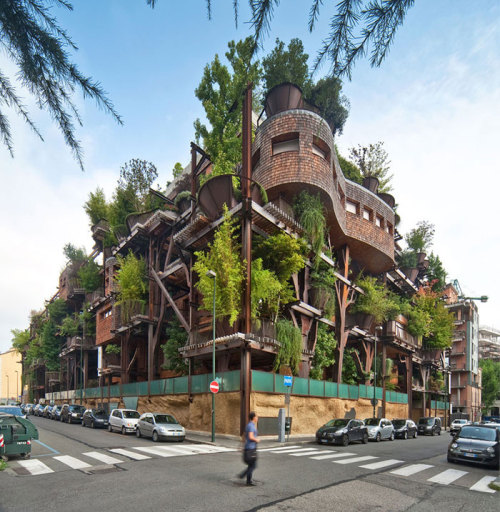
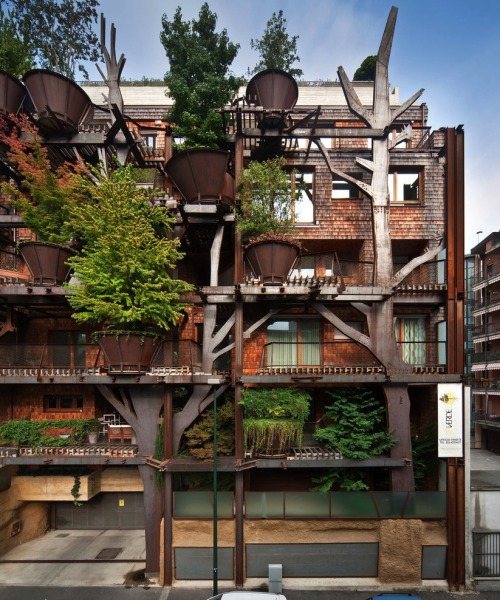
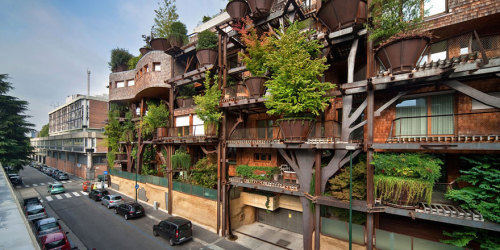
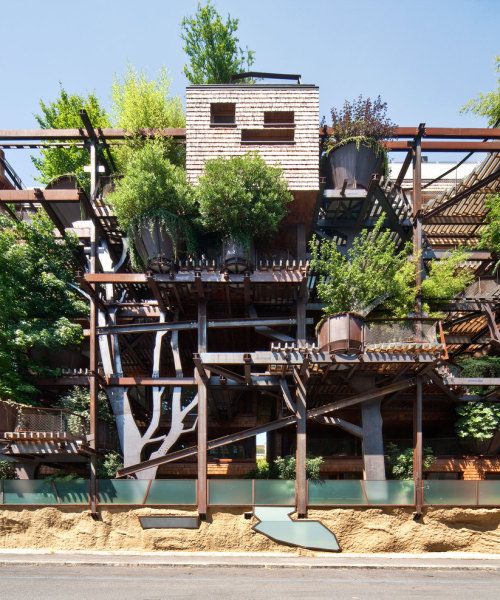
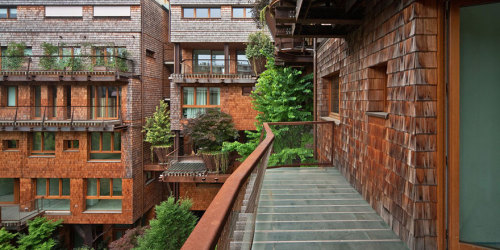
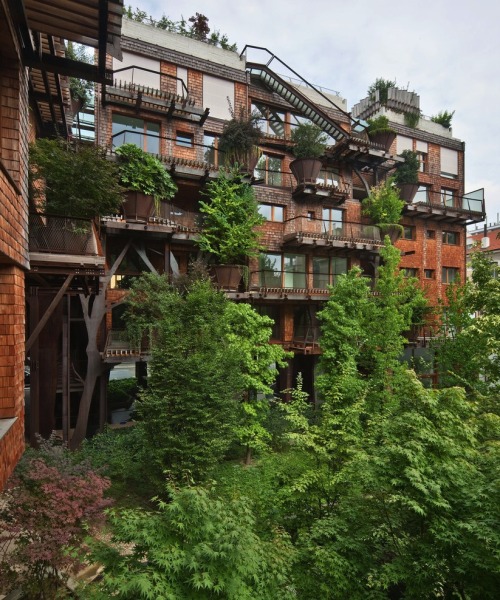
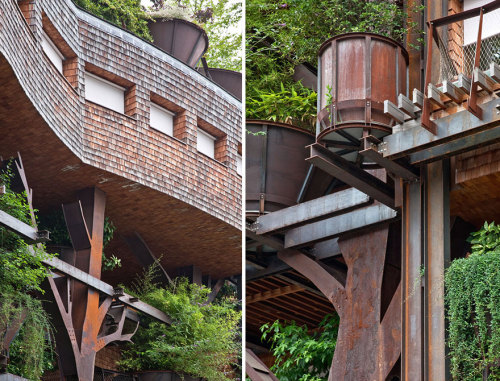
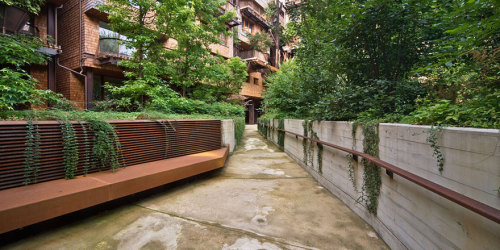
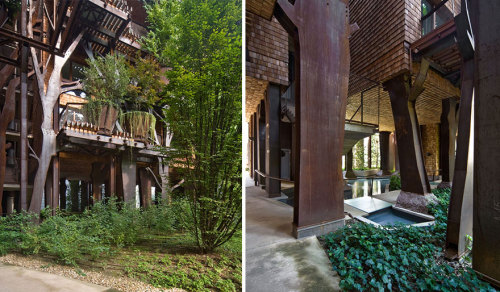

Urban Treehouse Uses 150 Trees To Protect Residents From Noise And Pollution
Luciano Pia, an architect in Italy, has a beautiful vision for how people and nature can live together even in a thoroughly urban landscape. 25 Verde, an apartment complex he designed in Turin, Italy, is a woven 5-story mix of lush trees and steel girders that let urban residents feel like they live in a giant urban tree-house.
Every step in the building’s design was taken with natural integration in mind. The organic and asymmetric shape of its terraces allow potted trees to “sprout” out from the building at random intervals. The ponds in the courtyard provide residents with a refreshing place to relax in the summer, and the 150 deciduous trees, which lose their trees in the winter, allow light to filter in to the building during the darker months. The building helps keep the city’s air cleaner and isolates the residents from the urban sounds and smells surrounding them.The building, which was completed in 2012, is located at Via Chabrera 25 in Turin, Italy – you can even check it out on Google Maps‘ street view!
Via:http://www.boredpanda.com/urban-treehouse-green-architecture-25-verde-luciano-pia-turin-italy/
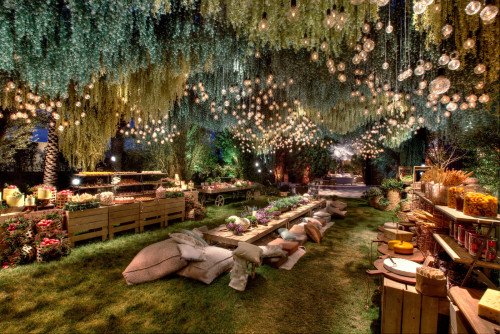

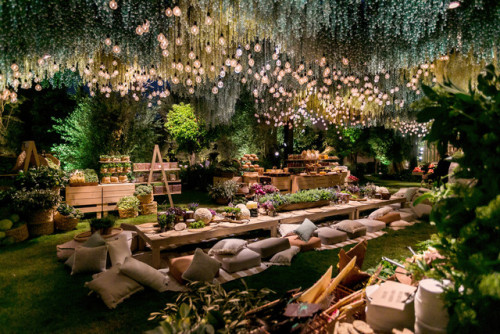
By Designlabexperience
Learning about edible plants (and eating them) has given me a lot of insight into the problems with the USAmerican food system
It's incredible how a supermarket gives you the sense of being surrounded by immense variety, but it's just the visual noise of advertising. In reality almost everything around you is just corn, wheat, soy, and milk, repackaged and recombined and concealed and re-flavored using additives, over and over and over again.
Does anyone know how to become a farmer?
I’m open to anything please help
-
 shadyhomestead-reference reblogged this · 1 year ago
shadyhomestead-reference reblogged this · 1 year ago -
 idee-montijo liked this · 1 year ago
idee-montijo liked this · 1 year ago -
 stupidification reblogged this · 2 years ago
stupidification reblogged this · 2 years ago -
 stupidification liked this · 2 years ago
stupidification liked this · 2 years ago -
 weeb-dweeb reblogged this · 2 years ago
weeb-dweeb reblogged this · 2 years ago -
 weeb-dweeb liked this · 2 years ago
weeb-dweeb liked this · 2 years ago -
 valpal4ever liked this · 2 years ago
valpal4ever liked this · 2 years ago -
 nonableistcatlady reblogged this · 2 years ago
nonableistcatlady reblogged this · 2 years ago -
 the-answer-is-dawn liked this · 2 years ago
the-answer-is-dawn liked this · 2 years ago -
 imgoingonanadventurebrb liked this · 2 years ago
imgoingonanadventurebrb liked this · 2 years ago -
 jedi-bird reblogged this · 2 years ago
jedi-bird reblogged this · 2 years ago -
 21stcenturyprairiegrl liked this · 2 years ago
21stcenturyprairiegrl liked this · 2 years ago -
 allatariel liked this · 2 years ago
allatariel liked this · 2 years ago -
 melyzard reblogged this · 2 years ago
melyzard reblogged this · 2 years ago -
 ironzelly liked this · 2 years ago
ironzelly liked this · 2 years ago -
 merrys-clone reblogged this · 2 years ago
merrys-clone reblogged this · 2 years ago -
 merrys-clone liked this · 2 years ago
merrys-clone liked this · 2 years ago -
 icarian-angel reblogged this · 2 years ago
icarian-angel reblogged this · 2 years ago -
 icarian-angel liked this · 2 years ago
icarian-angel liked this · 2 years ago -
 psychic-pomegranates liked this · 2 years ago
psychic-pomegranates liked this · 2 years ago -
 cavemeatmcmeatcave reblogged this · 2 years ago
cavemeatmcmeatcave reblogged this · 2 years ago -
 cavemeatmcmeatcave liked this · 2 years ago
cavemeatmcmeatcave liked this · 2 years ago -
 joywizard reblogged this · 2 years ago
joywizard reblogged this · 2 years ago -
 brazenedminstrel liked this · 2 years ago
brazenedminstrel liked this · 2 years ago -
 redneckromancy reblogged this · 3 years ago
redneckromancy reblogged this · 3 years ago -
 53rdcenturyhero reblogged this · 3 years ago
53rdcenturyhero reblogged this · 3 years ago -
 hundredsandthousandsandmillions reblogged this · 3 years ago
hundredsandthousandsandmillions reblogged this · 3 years ago -
 starsailor83 liked this · 3 years ago
starsailor83 liked this · 3 years ago -
 sisterofreverance liked this · 3 years ago
sisterofreverance liked this · 3 years ago -
 lillianmmalter reblogged this · 3 years ago
lillianmmalter reblogged this · 3 years ago -
 snailpricot liked this · 3 years ago
snailpricot liked this · 3 years ago -
 newtinaboot liked this · 3 years ago
newtinaboot liked this · 3 years ago -
 glowysquid liked this · 3 years ago
glowysquid liked this · 3 years ago -
 hellshire-harlot liked this · 3 years ago
hellshire-harlot liked this · 3 years ago -
 emmerila liked this · 3 years ago
emmerila liked this · 3 years ago -
 masquerading-man liked this · 3 years ago
masquerading-man liked this · 3 years ago -
 53rdcenturyhero reblogged this · 3 years ago
53rdcenturyhero reblogged this · 3 years ago -
 anavirable liked this · 3 years ago
anavirable liked this · 3 years ago -
 unbakehisbeans reblogged this · 3 years ago
unbakehisbeans reblogged this · 3 years ago -
 unbakehisbeans liked this · 3 years ago
unbakehisbeans liked this · 3 years ago -
 themagicofmistymornings liked this · 3 years ago
themagicofmistymornings liked this · 3 years ago -
 milkjelli liked this · 3 years ago
milkjelli liked this · 3 years ago -
 hissinghats reblogged this · 3 years ago
hissinghats reblogged this · 3 years ago -
 hissinghats liked this · 3 years ago
hissinghats liked this · 3 years ago